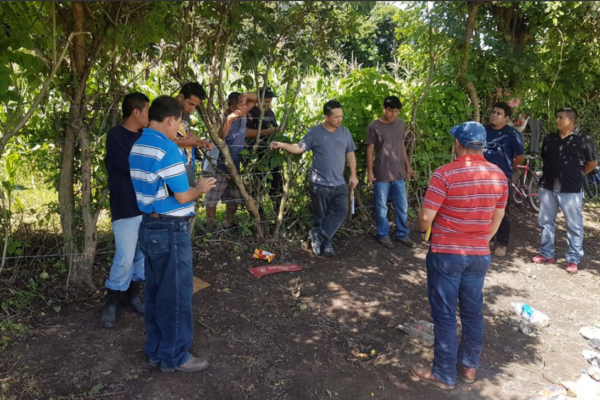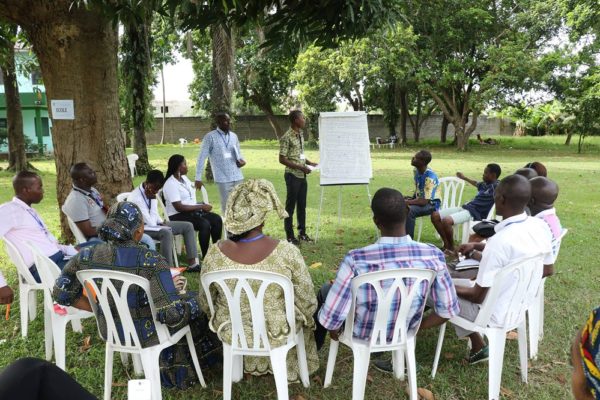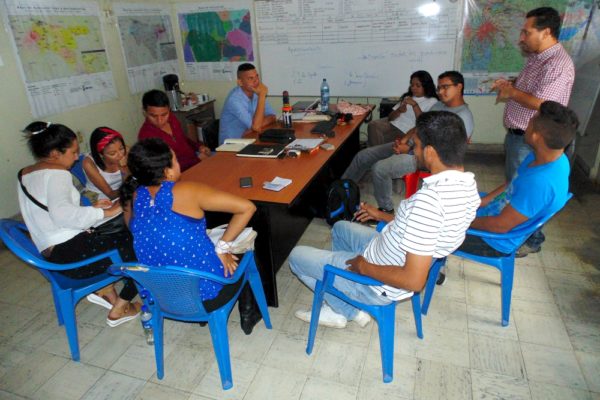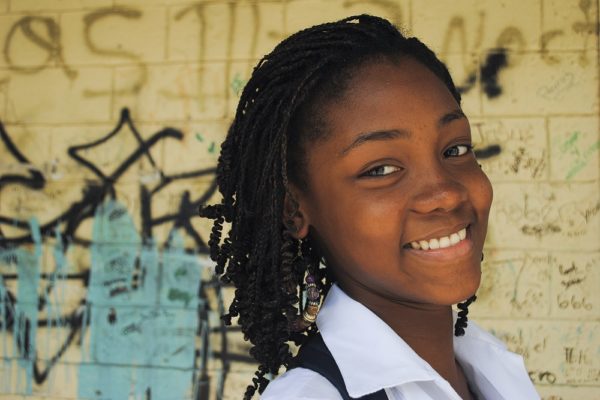From West Africa to Central America: Youth at the center of peacebuilding

Going beyond negative stigmas to transform youth’s agency
Today’s youth generation is the largest the world has ever seen: there are 1.8 billion people between the ages of 10 and 24[1]. This period in a person’s life is critical to their physical, intellectual and emotional development, largely defining their social and economic prospects for the future. Ceaseless energy and vitality describes this coming of age, where youth become pro-active members of society, many times assuming the role of providers and caregivers. According to the United Nations Development Programme (UNDP), one third of youth around the world, live in countries that have suffered a violent conflict, and 75 million of them are currently unemployed.
In many conflict-affected regions of the world, youth are blamed for the high rates of violence, failing to recognize that these forms of violence are symptoms of a greater problem. Illegal economy, organized crime, gang activity, and other forms of violence, are caused by an array of deeply entrenched social and structural factors, including: poverty, inequality and institutional fragility, where youth are the largest population of victims. The World Health Organization (WHO) indicates that over 200,000 youth are killed between the ages of 10-29, which is 43% of the total number of homicides committed globally each year.
In regions like Central America, youth-related violence[2] has been dealt with by using repressive mechanisms that go from massive incarceration to extrajudicial killings, failing to identify the social and economic causes of conflict. In regions like West Africa, civilians lose faith in the authority’s capacity to protect them against youth-related violence, and in desperation communities organize self-defense actions that inevitably prolong violence.
As a result, in many countries around the world, youth have been stigmatized and marginalized as the main protagonists of criminal violence. Often viewed as dangerous and a threat to society, they are subject to negative stereotypes that perpetuate vicious cycles of violence. On the other hand, youth are also viewed as vulnerable and helpless. This predominant negative discourse however, has been challenged by recent policies and research, that acknowledge youth’s agency and positive role in society, and how their involvement in decision-making processes is crucial in developing sustainable and legitimate solutions.
It is vital that we stop fearing young people and start acknowledging them as partners in the development of society. As a peacebuilding organization, Interpeace has worked with youth groups in Latin America and Africa, for over 20 years, to try to better understand youth-related violence, identifying the factors that cause it, and subsequently developing strategies to help this vulnerable generation become positive agents of change in their communities.

Workshop in El Salvador. Photo credit: Interpeace
Identifying the root causes of youth-related violence
There is growing interest in young people’s engagement in new forms of violence, which are generally being analyzed through lenses of radicalization and violent extremism. As the international community seeks to eradicate this phenomenon, it is crucial to understand its structural and root causes.
Over the past few years, new forms of violence have started to emerge in Côte d’Ivoire and Mali. In Abidjan, young men between the ages of 8 and 25 join organized youth groups, commonly referred to as “microbes” (germs). These boys are accused of violent robberies, and in some rare cases of homicide. In Mali, the reactivation of diverse armed groups, who claim to be inspired by a jihadist ideology, has increased the levels of violence in the region. As a way to cope with this crisis, Interpeace, with its local partners IMRAP and Indigo Côte d’Ivoire, conducted a participatory research to understand the trajectories of young people towards new forms of violence. Over the course of seven months, with the support of UNICEF, researchers engaged with 741 people from a range of communities in Côte d’Ivoire and Mali.
The report “Beyond Ideology & Greed: Trajectories of Young People towards New Forms of Violence in Côte d’Ivoire and Mali,” was launched at the end of 2016, with research findings that truly urge people to challenge their preconceived ideas about the root causes of this social phenomenon. It is widely believed that unemployment and religious ideologies are pivotal factors that contribute to radicalization and violent extremism in West Africa, but the research findings show that these elements are, in fact, secondary. Research showed that the most important factor of youth’s involvement in new forms of violence is their need to find their place in society, to be recognized and valued in their communities. Therefore, young people engage in violent activities because these youth groups represent a structure where they can “be someone”. Moreover, the research identified a phenomenon of “professionalization of violence,” which describes how youth acquire social acceptance and value, through a positive recognition of the violence they perpetrate.
Therefore, after 10 years of working in Central America, we have arrived to similar conclusions: dynamics that push young people to join or remain in violent groups are often related to identity, opportunities for social mobility and the security of belonging that comes from being a part of a group.

Workshop in Côte d'Ivoire. Photo credit: Indigo
Implementing structures that provide positive sources of identity and recognition
A person’s identity is defined by their immediate relationships- their relationship with family members, friends, co-workers and their community. “Being someone” is determined by the recognition of their peers, and in turn, recognizing one’s identity determines a person’s place in the world.
In the life of a young adult, determining their place in society is an invaluable factor that greatly contributes to their actions and lifestyle. Finding a place in the world and most importantly in their immediate world, is of critical importance. Therefore, for vulnerable youth in conflict-affected regions like West Africa and Central America, their identity is built around the only structure that gives them the possibility to feel part of a group: violent youth groups. As a result, providing an alternative social structure that can enable youth to build an identity without the use of violence is necessary to help prevent and eradicate youth-related violence.
Central and South America have the highest homicide rates in the world; and gang activity and juvenile delinquency are two of the main factors that cause these high murder rates. Interpeace has been working in Latin America since 2007, leading participatory processes to develop comprehensive public policy proposals, to prevent youth-related violence, and implementing peacebuilding initiatives with at-risk youth. At the beginning of 2016, Interpeace began developing the programme “Comprehensive initiatives to prevent violence in El Salvador.” The project works with at-risk youth between the ages of 18 and 29, with the objective to help them build capacities for entrepreneurial activities. This programme entails three specific steps: the first is to provide young adults with the necessary tools and methods to peacefully transform conflict. The second step, consists on training these young adults in the field of entrepreneurship. And lastly, the third step involves overseeing the establishment of productive associations and providing seed capital, specifically for materials and equipment to enable the implementation of their entrepreneurial ideas.
Interpeace is aware that this project will not stop historical inequality and poverty rates in El Salvador. Providing vulnerable youth with resources to build their own businesses, can help improve their living conditions, but this is not the ultimate goal. As indicated by years of accumulated knowledge in the region, vulnerable youth need positive social structures that can provide them with a sense of identity and belonging. In this sense, engaging in new trades and starting their own enterprise, is providing vulnerable youth with non-violent social structures that enforce social cohesion, social recognition and the possibility for social mobility. Therefore, the most important activity in helping provide job opportunities for youth is not the job creation itself, but rather the close accompaniment that ensures that having a job translates into gaining social recognition.
As a result, through these initiatives, vulnerable youth are provided with a sense of identity, confidence and solidarity, which are values that attract them to join violent groups, but in non-violent and non-criminal ways. Essentially, helping them develop their own business is providing an alternative, so that violence is not a vital part of their identity.

Workshop in El Salvador. Photo credit: Interpeace
Vulnerable youth as peacebuilders
As research shows, young people’s need to feel part of a group and feel recognized, are the driving forces behind their biggest decisions and actions. Unfortunately for vulnerable youth around the world, the social structures that surround them are in many ways fueled by criminal and illegal activities. In turn, marginalization and exclusion continue to undermine their agency and their possibility to make positive changes in their community. This is the reason why youth are at the center of our peacebuilding initiatives in West Africa and Central America. Identifying root causes for youth-related violence and helping youth develop their identity through positive social structures will help trigger more legitimate and sustainable solutions.
Because the exclusion and marginalization of groups in society, sow the seeds for renewed violence, our peacebuilding programmes are designed to include participants from across society, engaging groups that are typically overlooked. This inclusive approach ensures that all social groups share a sense of ownership and responsibility for reconciliation and rebuilding their society. Working with at-risk youth therefore empowers this sector in society, to participate in defining their own problems and finding long-term, sustainable solutions.
“We need to stop seeing young people as a threat and make them part of the solution. That starts with engagement. We need to listen to their hopes and fears and make their voices audible in the debate on the present and the future.” Interpeace’s Director-General Scott Weber

Honduras. Photo credit: Armando García
[1] According to the United Nations Population Fund – UNFPA.
[2] Youth-related violence in Central America is understood as violence where youth are perpetrators and victims.
